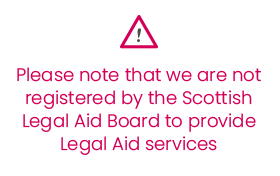Separation agreements for the self-employed, Employment Lawyers Glasgow
A relationship breakdown is difficult to deal with no matter who you are, but if you are self-employed, a whole new level of stress can be added as you also have a unique set of financial and practical issues to consider. At MSHB we put our 200-plus years' experience of working with business owners to good use to help our clients navigate their separations in a way which protects them and their families now and in the future. We understand your unique position and have the perfect blend of family and commercial law expertise to meet your needs and support you at this confusing time. To discuss your specific circumstances, call us today on 0141 221 1919 or fill in our online enquiry form.
Separation agreements in Scotland
A separation agreement is an agreement which is usually made when a couple have split up, but aren’t (yet) getting divorced or having a civil partnership dissolved. It works to govern their joint affairs during and after the breakup, addressing areas such as childcare, finances, and division of property ownership. There are a number of reasons separating couples can choose to take this route to govern their relationship, for example:
- They have never formalised their relationship through marriage or a civil partnership, and want a legally binding agreement addressing how things such as childcare, finances and housing will work now that they are no longer together.
- There are religious or there are other reasons why they have decided not to apply for a divorce or dissolution.
- They are applying for a divorce or are considering getting one in the future, but need to have an agreement about how things are going to work in the meantime.
- Having a separation agreement already in place can also make the process of getting a divorce quicker and cheaper, as the divorce can be treated as uncontested.
Are separation agreements legally binding?
In Scotland, a separation agreement is considered by the courts to be a legally binding contract, provided it is executed correctly and meets any other legal requirements. You should seek legal advice if you want to be sure that what you have agreed is enforceable through the courts.
What are the benefits for the self employed?
Here at MSHB, we have come across a vast range of circumstances where couples have found that having a separation agreement in place makes breaking up a little less difficult and safeguards their interests if the communication does break down. However, it is our experience that a separation agreement is especially helpful in situations where one or both partners are self-employed. This is because:
Business assets and interests may be at stake.
This is arguably the most important reason we give our self-employed clients for pursuing a separation agreement. If you are married or in a civil partnership, business assets you have acquired during the marriage can be classed as ‘matrimonial property' by the courts and therefore are fair game for dividing up between the parties. Understandably, most business owners would rather their former partner had no claim to or involvement in their business, or at least want to control the way this happens. A separation agreement can allow for the division of business assets to be tailored to your specific needs as a couple.
It saves time and money.
The fact is that most of the time being self-employed isn’t as glamorous as TV makes it seem. There are a huge range of benefits of course, but often money can be tight and income unpredictable. A separation agreement is often a much cheaper and less time intensive method of establishing how your post-breakup affairs are going to work. If you do end up applying for a divorce or dissolution, having an agreement already in place can massively speed things up and reduce complexity, which will decrease the amount you pay in legal costs.
A separation agreement can be tailored to suit you.
Many of those who are self-employed do not work conventional 9-5 hours, and there is less predictability in terms of the volume of work and the amount of income coming in each month. Putting a separation agreement in place means that you can tailor your approach to matters such as childcare, support payments and asset division to account for these issues. It is our experience that having a separation agreement in place in these situations also tends to make for a more harmonious breakup because expectations around areas such as childcare and finances are clearly set and make sense for your family.
Where we can help
No matter what your circumstances are, splitting up can be very difficult. For the self-employed, this can be doubly true as not only are their personal lives are affected, but their professional lives may also be impacted. At MSHB our specialist family team is always on your side to ensure things go as smoothly as possible. We know that every client and every family is different, so we will use our professionalism, exceptional standards of client care and years of expertise to ensure that the agreement you reach is one which works for you.
Contact our Separation Agreement Lawyers in Glasgow, Scotland
At Miller Samuel Hill Brown we understand that every family is different and every relationship has its own challenges and needs, particularly as it is ending. Our tailored and knowledgeable service can help you plan for the future in a way which is right for you. Call us on 0141 221 1919 or fill in our online contact form and we will be in touch very shortly.
















